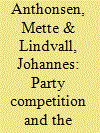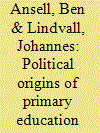|
|
|
Sort Order |
|
|
|
Items / Page
|
|
|
|
|
|
|
| Srl | Item |
| 1 |
ID:
087691


|
|
|
|
|
| Publication |
2009.
|
| Summary/Abstract |
This article argues that after the Golden Age of capitalism, corporatist methods of policy-making have come to depend on specific modes of party competition. In contrast to previous studies of corporatism, which have argued that corporatism depends on strong social democratic parties, this article suggests that the competition between well-defined left-wing and right-wing 'blocs' has become detrimental to corporatism. In countries with mixed governments or traditions of power-sharing, on the other hand, corporatism thrives. These conclusions are based on a comparison of four traditionally corporatist countries - Denmark, the Netherlands, Sweden and Switzerland - from the early 1970s to the late 1990s.
|
|
|
|
|
|
|
|
|
|
|
|
|
|
|
|
| 2 |
ID:
127801


|
|
|
|
|
| Publication |
2013.
|
| Summary/Abstract |
This paper is concerned with the development of national primary education regimes in Europe, North America, Latin America, Oceania, and Japan between 1870 and 1939. We examine why school systems varied between countries and over time, concentrating on three institutional dimensions: centralization, secularization, and subsidization. There were two paths to centralization: through liberal and social democratic governments in democracies, or through fascist and conservative parties in autocracies. We find that the secularization of public school systems can be explained by path-dependent state-church relationships (countries with established national churches were less likely to have secularized education systems) but also by partisan politics. Finally, we find that the provision of public funding to private providers of education, especially to private religious schools, can be seen as a solution to religious conflict, since such institutions were most common in countries where Catholicism was a significant but not entirely dominant religion.
|
|
|
|
|
|
|
|
|
|
|
|
|
|
|
|
| 3 |
ID:
091122


|
|
|
|
|
| Publication |
2009.
|
| Summary/Abstract |
A number of influential studies in political science argue that important economic policy changes in the rich democracies since the mid-1970s were caused by the introduction of new economic ideas. This article claims that while experts exert strong influence over the selection of policy instruments, their influence over the formulation of policy objectives is much weaker. In the 1970s, 1980s, and 1990s, the predominance of Keynesianism in Austria and Denmark did not lead Austrian and Danish governments to maintain low unemployment longer than Sweden, where Keynesianism was less strong. But it did lead them to regard fiscal policy as an instrument that can be used to control the level of activity in the economy, while their Swedish counterparts relied instead on exchange rate and monetary policy.
|
|
|
|
|
|
|
|
|
|
|
|
|
|
|
|
| 4 |
ID:
121910


|
|
|
|
|
| Publication |
2013.
|
| Summary/Abstract |
Why do trade unions organize antigovernment strikes in some countries but not in others? This article argues that there is a curvilinear relationship between union density and political strike activity. Political strikes are rare in countries with low union density, since effective protests require a basic level of organizational capacity. They are also rare in countries with high union density, since a government that faces a strong union movement has powerful incentives to adjust its policies in order to avoid open confrontation. But political strikes are relatively common in countries with moderate levels of union density, since it is difficult for governments and unions to find viable compromises when the strength of the unions is not secure. The empirical part of the article estimates the relationship between union density and the likelihood of political strikes in two samples of advanced democracies.
|
|
|
|
|
|
|
|
|
|
|
|
|
|
|
|
|
|
|
|
|